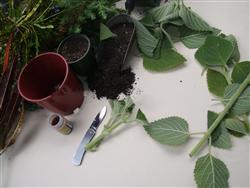
LEARN THE ASPECTS OF PROPAGATION
"Save Money by Propagating your own Garden Plants at Home".
A starter course for students with no previous experience of propagation.
- Covers all aspects of plant propagation.
- Develop knowledge to start and run your own propagation nursery.
- Learn about seed, cuttings, grafting, division, layering, materials and equipment.
- Learn all this from industry experts - our tutors!
Learn home Propagation
Mastering this course is an excellent way to save money by propagating your own plants at home.
- Indulge a passion

- Enrich your garden
- Maybe even start a small business
" Thanks for the videos, they are great! I got a lot of
information from them. The Turf Management video is practical and easy
to understand. Plant Propagation is a video every student should watch
because out here in the real world no-one would give out such
information. The Rose Growing Tape was very beneficial to me as I have
about 60 odd roses. I thought I knew a little about them but this tape
is a real eye-opener."
- Kelvin
How Are Plants Propagated?
There are many different ways of producing plants though most plants
are produced commercially by either seed or cutting propagation. ‘Tissue
culture’ or ‘micropropagation’ techniques carried out in a laboratory
are sometimes used where very large numbers of one plant variety are
required quickly, or where limited propagation stock is available. Other
plants (e.g. roses, deciduous fruit and ornamental trees) are
traditionally produced by budding and grafting onto seed or cutting
grown root-stocks. Division and separation are commonly used for the
propagation of bulbs and herbaceous perennials.
Other propagation techniques (e.g. layering or marcotting) may be
important in the propagation of some specific types of plants; however
they are relatively insignificant when taking a broad view of the
nursery industry. You will learn more about these different methods in
this useful course.